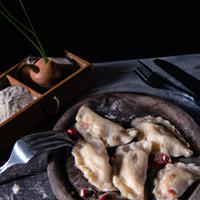
1 serving (100 grams) contains 200 calories, 6.0 grams of protein, 5.0 grams of fat, and 30.0 grams of carbohydrates.

Log this food in SnapCalorie

Nutrition Information
Calories |
476.2 | ||
|---|---|---|---|
% Daily Value* |
|||
| Total Fat | 11.9 g | 15% | |
| Saturated Fat | 4.8 g | 24% | |
| Polyunsaturated Fat | 0 g | ||
| Cholesterol | 23.8 mg | 7% | |
| Sodium | 952.4 mg | 41% | |
| Total Carbohydrates | 71.4 g | 25% | |
| Dietary Fiber | 4.8 g | 17% | |
| Sugars | 4.8 g | ||
| protein | 14.3 g | 28% | |
| Vitamin D | 0 mcg | 0% | |
| Calcium | 47.6 mg | 3% | |
| Iron | 3.6 mg | 20% | |
| Potassium | 357.1 mg | 7% | |
* Percent Daily Values are based on a 2,000 calorie diet. Your daily values may be higher or lower depending on your calorie needs.
Food Attributes
Source of Calories
About Pierogis
Pierogis are traditional Polish dumplings made by wrapping a thin dough around a flavorful filling and boiling, frying, or baking them. Common fillings include potatoes, cheese, sauerkraut, cabbage, mushrooms, meats, or fruit. They are often served with toppings like sour cream, butter, onions, or bacon for added richness. Pierogis are a comforting dish with origins rooted in Eastern European cuisine, celebrated for their versatility and heartiness. Nutritionally, they offer a mix of carbohydrates from the dough and protein or fiber depending on the filling. Some variations can be high in saturated fats and calories, especially when fried or paired with heavy toppings, so portion control and preparation methods are key for a balanced intake. Healthier options include steaming or baking the pierogis and pairing them with lighter accompaniments like Greek yogurt or fresh greens.



